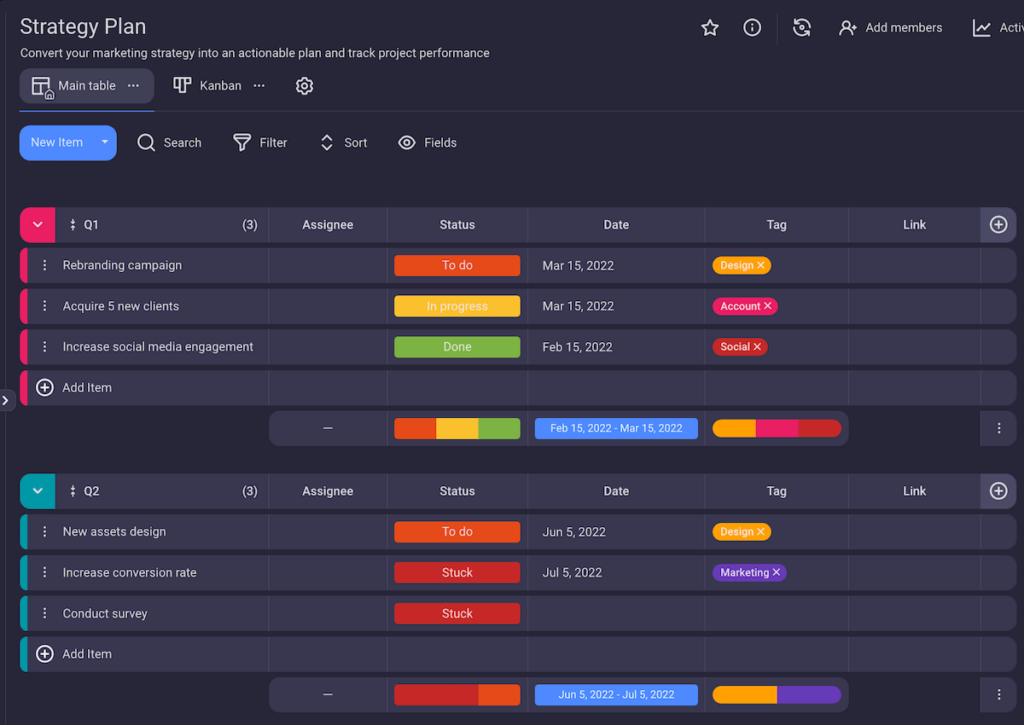Managing a project can be a daunting task. People often get buried in assignments, deliverables, and unexpected problems, and lose focus of initial goals. In fact, only 34% of organizations mostly or always complete projects on time or on budget.
So, how can you make sure this doesn’t happen to you? The answer is — you should clearly define the project’s critical success factors.
In this article you will learn about:
- What critical success factors are,
- What types of critical success factors exist, and
- Top 10 critical success factors in project management.

What are critical success factors (CSFs)?
According to Prince2, critical success factors (CSFs) refer to “elements in a project that are critical to a project achieving its mission or goal”.
Basically, CSFs are the targets that must be met for a project to be successful. They are measured by Key Performance Indicators (KPIs).
KPIs represent performance data that allows project managers to keep track of their team’s performance and to, therefore, have some control over it.

Why are critical success factors important?
It is not enough to simply finish the project on time and within budget. If you want to truly give it your best effort and achieve the most with the available resources, you need to keep in mind critical success factors.
Now, projects are complex, with a series of deliverables to complete and goals to reach. In order not to get sidetracked or lost in a vast amount of tasks and obligations, it is necessary to have a firm grasp on what factors are important to complete each deliverable.
You must identify what factors influence project success or failure and know how to apply them to your project.
4 Types of critical success factors
Each project has its own, specific CSFs, so they cannot be copied from one project to another.
There isn’t one universal formula that you can use on each of your projects, as there are many kinds of critical stress factors.
However, CSFs can be divided into 4 types:
- Industry CSFs
- Strategic CSFs
- Temporal CSFs
- Environmental CSFs
Type #1: Industry CSFs
Industry CSFs are specific to each industry, and they can sometimes be shared by competitors. These factors are what sets you apart from the competition in the eyes of your clients.
Some examples of this type of CSFs are:
- Being considered a luxury brand in the industry, or
- Entering a specific business market.
Type #2: Strategic CSFs
Strategic CSFs influence the success of a project by realizing relevant and beneficial partnerships and ensuring stakeholder engagement.
One instance of strategic CSFs would be finding an expert in the field and securing a contract with them.
Type #3: Temporal CSFs
Temporal CSFs incorporate changes which are not permanent.
Some examples of temporal CSFs include:
- A reduced number of staff, or
- A change in business prioritization.
Although the effect of these CSFs is limited, it can still significantly influence the overall timeline of the project and cause setbacks.
Type #4: Environmental CSFs
Environmental CSFs consider external variables that the company or business has no control over, such as a change in the economy or regulations.
Even though we can’t influence environmental CSFs, we can keep an eye on the external changes and trends to prepare ourselves for our future projects.
Top 10 critical success factors in project management
Although there are many different success factors depending on the type of project you are managing, these are the 10 most crucial ones:
CSF #1: The project manager’s influence on a project
The project manager’s role in a project is crucial, as they are responsible for all major decisions which can make a difference between a successful project and a failed one.
However, as little as 47% of projects are led by certified project manager professionals. So, if you are not a certified PMP, don’t panic. What is most important is that you work on the necessary skills to do the job efficiently.
💡 Plaky Pro Tip
If you want to become a great project manager, check out the following resources:
CSF #2: Clear project goals
It is important that project goals are clearly defined from the beginning and that the management, project sponsors, and other stakeholders are aware of all project goals.
Having clear project goals helps you better plan your projects and makes it easier to stay on track throughout the whole project and not lose focus.

CSF #3: An elaborate plan
Projects are complex endeavors and require elaborate planning. Before you start working, make sure you take time to consider the project from all angles. Then, come up with a project plan you, the management, and the clients are satisfied with.
You need to decide on the budget and the resources needed, and set a realistic deadline. Then, delegate the work to team members and make sure everyone knows how they are supposed to contribute to the goal.
Without a good plan you will be easily overwhelmed with too much work, problems, and decisions to be made in a short span of time.
CSF: #4: Project scope
As a part of the goal-setting and planning processes, it is important to clearly define your project scope. This helps identify all the work that needs to be completed for the project to be successful.
To manage the project scope successfully, you need to set priorities and identify project dependencies, i.e. relationships between project tasks.
Which task takes priority over the other?
Which task can’t start without another being completed?
What is the time frame for each of these tasks?
Keeping these questions in mind from the very beginning ensures that no team will have to wait on another to finish their task. Also, it minimizes the chances that an important task will not be completed because too much time and resources were spent on finishing a lower priority task.
💡 Plaky Pro Tip
The answers to the aforementioned questions can be determined using the Critical Path Method (CPM). If you are interested in learning more about it, check out the link below:
CSF #5: Top management support
Top management support is closely connected to project planning. You have to make sure that top management is on board during all stages of the project.
Since one business or company usually runs several projects at the same time, you have to ensure that management sees the value and importance of your project at all times.
CSF #6: Competent and motivated team
The competence, education, and motivation of the people working on a project is directly connected to the success of that project.
You have to choose people with the necessary skills, experience, as well as motivation to see the project through.
That way, at each stage of the project, there will be someone who will be able to offer a solution to a problem that arises. Also, as projects tend to be long and time-consuming, motivation is what keeps the people working hard and doing their best until the project is finished.
💡 Plaky Pro Tip
Find out more about how to foster better project management teamwork in this blog post:
CSF #7: Open and effective communication
Open and effective communication in project management is extremely important for smooth running of the project. Managers should be informed about the progress, costs, advances, and setbacks in the project.
You should establish communication channels between stakeholders so that everyone can be kept in the loop throughout the entire length of the project. This way, all problems can be solved faster, and stakeholders are always aware of all the latest developments.
The easiest way to ensure smooth communication is to use project management software.
CSF #8: Project management software
With the development of technology, project management is advancing as well. Nowadays, many project managers use project management software to make running the project easier.
In it, you can share files, delegate work, and track other people’s progress. Project management tools are a good way to keep everyone informed now that a lot of people work from home and do not have a chance to see each other in person.
One such project management tool is Plaky.

You can use Plaky to:
- Schedule tasks,
- Assign work to teammates,
- Discuss work, and
- Give feedback.
💡 Plaky Pro Tip
Plaky is available as an IOS and Android app.
Moreover, when you are a part of a project in Plaky, you will be notified when there is an update on a task you’re subscribed to or when somebody mentions you.
This way, there is no need to constantly check the progress of each project you are working on, since you will not miss anything.

CSF #9: Risk management
Every project has its own risks and potential problems. It’s important to try to identify all the possible project risks at the initial stage of your project.
That way, when a problem does occur, you are not caught unaware but already have a plan of action prepared. This will help prevent the need for the project to be prolonged and the budget to be broken. It will also save the project from failing completely due to unaccounted problems occurring.
💡 Plaky Pro Tip
If you want to read about risk management in more detail, we recommend checking out this blog post about risk management:
CSF #10: Project evaluation
Each project is an opportunity to learn something new and become a better project manager.
After the project is finished, organize a post-mortem meeting with your team in which you analyze all aspects of the process, both positive and negative.
What made the project run smoothly?
What caused setbacks?
How can your next project be better than the last?
By answering these questions, you will be able to make your next project better than the last.
💡 Plaky Pro Tip
Learn more about project evaluation and how to implement an effective evaluation process in the post below:
Conclusion: Become a successful project manager by paying attention to critical success factors
To wrap up, managing a project is by no means an easy task. However, identifying what factors influence project success or failure will help you run a project virtually stress-free.
In this article, we have covered the key success factors that you should consider when managing a project:
- Project manager’s influence on a project
- Clear project goals
- An elaborate plan
- Project scope
- Top management support
- Competent and motivated team
- Open and effective communication
- Project management software
- Risk management
- Project evaluation
If you implement what you have learned in this article, and pay attention to the top 10 project success factors, you will no doubt deliver a successful project.
✉️ Has this article helped you in managing your project? Can you think of any other important project success factors? Let us know at blogfeedback@plaky.com, and we may include your ideas in our future posts. If you think this post is interesting or useful, share it with someone you think would benefit from it.
